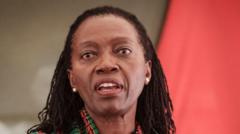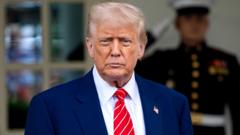The alleged "United States of Kailasa," led by the fugitive guru Swami Nithyananda, faced significant legal repercussions in Bolivia after officials arrested members for engaging in unlawful land transactions. Despite claims of sovereignty and divine powers, their narrative has met a harsh reality check.
The Unraveling of Kailasa: A Fictional Nation's Struggle for Sovereignty

The Unraveling of Kailasa: A Fictional Nation's Struggle for Sovereignty
Fugitive leader Swami Nithyananda's self-proclaimed nation faces legal downfall in Bolivia following illegal land deals with Indigenous groups.
Representatives of the so-called "United States of Kailasa," an imagined sovereign nation for Hindus led by the fugitive Swami Nithyananda, have recently attracted unwanted attention. This self-proclaimed nation, which features a fictitious constitution and an invented currency, has encountered serious legal issues resulting from increasingly brazen actions in Bolivia.
Last week, Bolivian officials detained 20 individuals linked to Kailasa, accusing them of orchestrating inappropriate land dealings with Indigenous groups that involved dubious 1,000-year leases over extensive portions of the Amazon rainforest. Following the arrests, the Bolivian government nullified these agreements and subsequently deported the Kailasa members to their respective countries, including India, the United States, Sweden, and China. Bolivia’s Ministry of Foreign Affairs made it clear that the nation does not recognize the so-called United States of Kailasa.
The strange saga of Kailasa traces back to 2019, when Swami Nithyananda — who describes himself as His Divine Holiness and the Supreme Pontiff of Hinduism — fled India amid serious allegations related to sexual assault and child abuse. Despite his controversial background, Nithyananda positioned his creation as a new spiritual haven, claiming its existence as the first sovereign Hindu nation.
Collaborators of Kailasa have made high-profile appearances at United Nations events, mingling with global leaders and promoting the nation’s fictitious narrative. They also allege that their leader possesses the ability to guarantee affluent clients a successful reincarnation, complicating their ethical legitimacy further.
As the international community takes note, the bizarre reality of the United States of Kailasa serves as a cautionary tale about the intricacies of land rights, spirituality, and the legal frameworks surrounding governance. The fall of this fictitious nation exemplifies the often-thin line between aspiration and reality in the pursuit of sovereignty and recognition on a global stage.






















